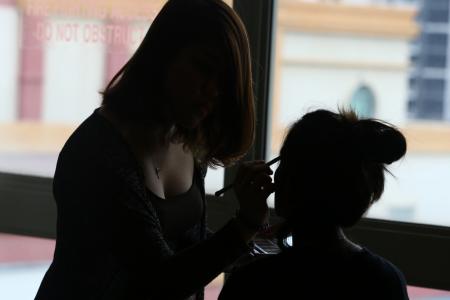Ex-drug addicts turn life around with make-up skills
Joy (not her real name) got hooked on a range of drugs since she was 18 due to bad company and peer pressure.
But after her arrest last year and six months in the Drug Rehabilitation Centre at Changi Women's Prison, the 24-year-old wanted to turn her life around.
She joined a beautician training programme, organised by Singapore Anti-Narcotics Association (Sana) and the distributor of global fragrances and cosmetics brands Luxasia, that equips female ex-drug offenders with professional make-up skills.
The one-month course is part of the Luxasia Foundation's Empowerment of Women Initiative, and aims to improve their lives and give them a head start for future employment in the beauty industry.
Joy and five other female ex-drug addicts joined the programme in September and graduated last Friday with a certificate in professional make-up skills.
She said she had been heavily addicted to methamphetamine, or Ice, and had been taking it daily last year.
One day, she took so much she ended up in the Institute of Mental Health where she was later arrested.
SELFISH
Joy said: "Looking back, I saw how selfish I was. My mum was heartbroken and very worried about me. I'm glad that I got caught, if not I wouldn't wake up (from my mistakes)."
She is now working at her mother's hair salon, but intends to find freelance work as a make-up artist soon.
Joy hopes her new skills will help her "make it up to my mum, and get back on track".
Echoing her sentiment, coursemate Aisha (not her real name), 25, a mother of three young children, said she wants to use her skills to make life better for her family.
She hopes to find freelance make-up projects and earn extra cash to supplement her day job at a shoe store chain.
"During the programme, I had to juggle my job, attending the course and taking care of my children. It was tiring, but it was worth it for my family," said the divorcee.
She decided to try Ice last year while she was going through her divorce.
It was her second time taking Ice. Aisha was in a hotel room with a friend when they were arrested.
"It was only my second time, but I learnt the hard way not to do drugs," said Aisha, who is staying at her sister's flat in Yishun.
Mr Abdul Karim, 53, Sana's Executive Director, said: "This project gives our women ex-offenders hope that society still cares for them and raises their self-esteem. It motivates them to continue their journey in life with confidence and be integrated into society."
Toolkit to help educate students on drugs
The fight on drugs is being taken to schools with the Preventive Drug Education (PDE) toolkit, which can be used by educators to teach students about the dangers of narcotics abuse.
The PDE toolkit was launched yesterday at the ACT! Conference on At-Risk Youths and was conceived by the Central Narcotics Bureau (CNB), with input from the Ministry of Education.
The toolkit was also one of the recommendations announced by the Task Force on Youths and Drugs (TFYD) in June.
It aims to equip educators and youth counsellors with knowledge on commonly-abused drugs and the effects and dangers associated with them, through information packages and lesson plans.
Said Mr Ganesh Kalyanam, director of Student and Graduate Affairs at Republic Polytechnic and a member of the TFYD Steering Committee: "Students nowadays are exposed to mass media and social media influences which glamourise the use of drugs such as cannabis.
"The toolkit is useful as it equips us with information and creative ideas on how to better engage our students on the dangers of drugs."
The PDE toolkits will be distributed to schools in January but it is already available for download from the CNB website.
By the numbers: Drug abusers arrested
Jan to July 2015
1,684
Jan to July 2014
1,560
Where can women seek help?
The Singapore Anti-Narcotics Association (Sana) helps about 40 women clients a year.
They are mostly ex-drug addicts who need help and support in rehabilitation or finding a job after serving time in jail or rehab.
The women make up about 12 per cent of the 350 clients they work with every year, said Mr Abdul Karin, 53, the voluntary welfare organisation's executive director.
He said: "Women ex-offenders can face different challenges.
"Having a family and taking care of their children might make things more complicated. They also have to deal with family acceptance and they might be dealing with more emotions."
If you, your family or friends need help or wish to see a counsellor at Sana, you can walk in at the Drop-In Centre on the fifth level of Sengkang Community Hub, or call 6386-0259, or e-mail sana@sana.org.sg.
Get The New Paper on your phone with the free TNP app. Download from the Apple App Store or Google Play Store now



